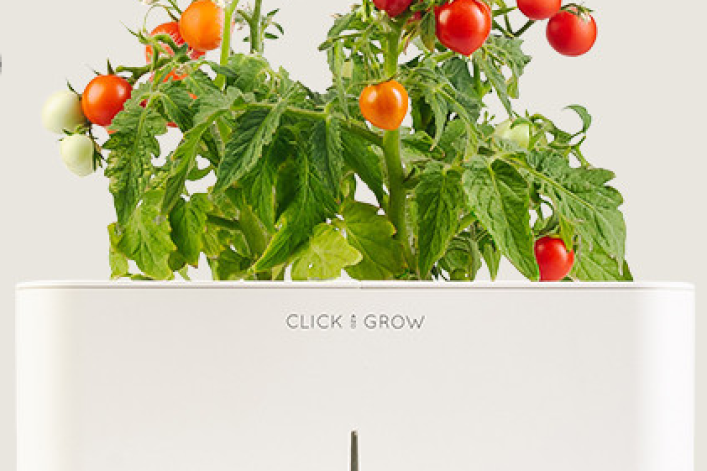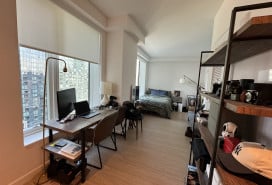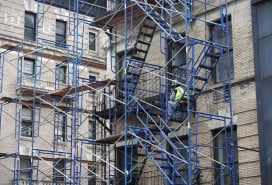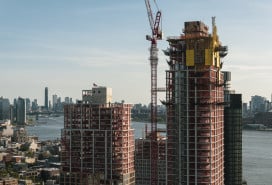7 ways to grow a (little) garden in your NYC apartment

In New York City, most of us settle for a visit to local park or a whiff of corner bodega flowers rather than backyard greenery, an herb or flower garden or even a view of a tree-lined street.
Luckily, some green-thinking companies have created some easy ways to bring—and, more importantly, grow--more greenery in your own NYC space, even if you've got the furthest thing from a green thumb and limited space:
Sprout Home (above) Started in Chicago and now with a Williamsburg, Brooklyn location, Sprout Home offers a few products that are ideal for the urban dweller with limited space and no outdoor space. Organic Bamboo Pot Grow Kits (not that kind of pot!) provide everything to allow one to grow lavender or basil in your own home. Likewise the company offers a Half-Pint Herb Grow Kit which allows you to grow basil, mint and thyme in a carton, and Garden in a Bag Grow Kits similar to Potting Shed Creations’ mentioned above.
Pros: Prices are affordable and comparable to competitors’. Because the firm has a location in Brooklyn, one could actually visit in person and sign up for classes they hold periodically.
Cons: Their instructions are not online and while descriptions say you will need sunlight and a “green thumb,” what that means exactly is rather ambiguous.
Click and Grow (above) is advertised as a “smart garden” because it allows you to easily grow plants in a modern, sleek electric pot without watering or fertilizing. Just add batteries and fill the water tank and choose a plant cartridge which contains seeds, nutrients and special technology to grow your chosen type of greenery. You can grow herbs, plants or flowers.
Pros: It's a quick and easy—and far less messy—way to grow a wide variety of plant life indoors with minimal effort.
Cons: At $79.00 for starter kits and $19.99 for refill cartridges, it's not cheap.
Burpee (above), the country’s leading home gardening company, offers 40 varieties of container-friendly plants that can be grown in small places like windowsills and fire escapes. Tip: Bush varieties require a smaller space for rooting and growth. Determinate tomatoes, also called "bush" tomatoes (as opposed to vining ones) are varieties that are bred to grow to a compact height and that ripen all their fruit at about the same time (over two weeks) and then die.
They do not require a large trellis to grow and are a good starting point. Herbs are also another easy choice for small spaces.
Pros: Seeds can be delivered directly to your door, are affordable and there is a wide variety of options for the small-space dweller. Information on plant spacing and growing needs can be found on each product page and they have a lot of other supplemental growing information in the ‘how-to’ videos on burpee.com.
Cons: Most likely you will need six to eight hours or sunlight or supplemental lighting e in order to grow most herbs, greens, and fruiting crops such as tomatoes and peppers. You will also need to get potting soil, pots and all gardening supplies. Could be very messy if trying to work in a very small space.
Potting Shed Creations (above) Don’t let the name fool you; for most items offered, no shed is required. Potting Shed offers a wide variety of plants, flowers and vegetables that can be grown indoors in one’s apartment or on a window sill . Materials are all sourced with eco-friendly ingredients and products contain as much natural material as possible. They can help you grow vegetation in any type of container--products for sale include vegetation that can be grown in bags, wine bottles, boxes and pots.
Pros: Good for beginners, affordable (prices range from $12 for a garden in a bag (think mini-strawberries somehow growing out of a Capri Sun bag) to $40 for tomatoes in a pail, and there's a wide variety of choices, including bonsai trees ($34). The site provides easy-to-understand instructions for most products.
Cons: None we can think of.

DIY Bonsai Tree Kit (above) The Golden Ficus bonsai tree is perfectly suited for growing indoors. The $69.95 kit includes an anti-Bonsai intimidation kit containing: 101 Essential Bonsai Tips Book; traditional Butterfly Bonsai shears; organic fish and seaweed fertilizer; “Superthrive” a vitamin supplement; copper-colored aluminum wire and a Chinese mud figurine.
Pros: According to the online reviews, it is great for beginners and the customer service is topnotch.
Cons: Bonsai trees, even in the best circumstances require a lot of maintenance and can be tricky to handle.
Chia Products (above) Probably one of the oldest and kitschiest ways to grow something in one’s home quickly and easily is the tried and true Chia Pet (your pet can be a frog, pig, bunny...). Aside from the original Chia Pet we’ve all come to know and snicker at around holiday time, Chia now has a wide variety of products that include animals, holiday decorations, cartoon characters and the most practical choice for a NYC apartment: the Chia Herb Garden (above) uses a “growing sponge” to enable you to grow fresh herbs indoors, even in winter without having a green thumb.
Pros: Cost effective at only $16.99 for an array of three different herbs, including seeds and pots.
Cons: The process appears to be a bit messy—soaking sponges and spreading seeds—and includes myriad steps. There are some light requirements for the herbal products and they must be maintained and watered in order to prevent stringy growth.
AeroGarden (above) What could be considered the “big guns” of indoor gardening, AeroGarden’s products are perfect for the light-challenged apartment-dweller who wants to yield some heavy duty greenery. Products allow New Yorkers to grow veggies (sometimes full-sized) and plants with minimal effort and minimal light year-round. Your plants grow in water with nutrient and oxygenated air to directly deliver nourishment to their roots. Everything is automated: light, nutrients and water reminders. Plants thrive under built-in automated grow lights. Extra seed packets of a wide variety of flowers, plants and vegetables can be purchased separately as can grow lights.
Pros: You can produce full-sized vegetables all year round with minimal light and effort. The closest product to yield the size and amount of crops from a real outdoor garden we've seen. No knowledge of gardening required. Units come in a variety of sizes and colors. Reviews for each product are consistently excellent.
Cons: These appear to take up a lot of space, the biggest of which is 14"W x 11"D x 33.5"H. This is the priciest option we’ve listed ranging from $99.95 for the AeroGarden 3 ,which is the smallest unit available which includes only one grow light to $249.95 for the AeroGarden Ultra which is the biggest unit that comes with three grow lights.
Related posts:
Urban Garden Center: A family biz with community spirit

























